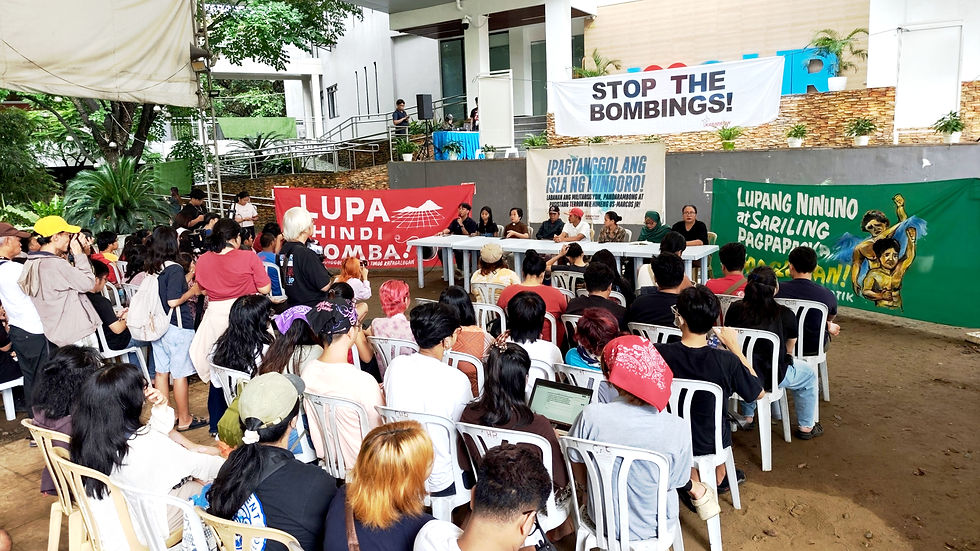Panaghiusa expresses strong solidarity with Defend Mindoro Network amid escalating militarization, rights violations
- Panaghiusa Philippine Network
- Jul 26
- 4 min read
Panaghiusa Philippine Network to Uphold Indigenous Peoples’ Rights firmly extends its solidarity to Defend Mindoro, a network advocating for the protection of Mindoro Island, which is home to the eight groups of Mangyan People and their ancestral land. Our network stands in resolute support of the collective resistance against militarization, plunder of resources, and the continuing violation of human rights.

Among the cases submitted by Panaghiusa to the United Nations Special Rapporteur on the Rights of Indigenous Peoples (UNSRIP) in 2024 is the extrajudicial killing of Hanunuo-Mangyan youth, Jay-el Maligday, in Oriental Mindoro.
The State Forces’ Killing of Jay-el Maligday
In the early hours of April 7, 2024, elements of the 4th Infantry Battalion of the Philippine Army launched an anti-insurgency operation in Sitio Suryawon, Nasucob, Bulalacao, Oriental Mindoro. At around 4:00 AM, soldiers reportedly encircled the homes of Indigenous villagers, ordering them to vacate at gunpoint. Minutes later, gunshots were fired from inside the Maligday residence, and 22-year-old Jay-el was killed on the spot.
The military later justified the incident as a "legitimate armed encounter," branding Jay-el as a member of the New Peoples Army. However, multiple eyewitnesses, including the village's Indigenous elders and Jay-el’s relatives, vehemently refuted the claim and affirmed that he had no links to any armed group and was unarmed at the time of his death. Witnesses further testified that the soldiers’ version of events was fabricated to justify the killing and shield the perpetrators from accountability.
This is a clear case of red-tagging, where individuals are wrongfully labeled as insurgents or terrorists to justify human rights violations committed by state forces. The traumatic effects of this violent encounter continue to haunt the community, especially children who witnessed their homes raided and their elders threatened at gunpoint.
Escalating Militarization in Mangyan Ancestral Land
Jay-el’s case is not isolated. The presence of armed forces in Indigenous territories has led to widespread displacement, harassment, and systemic human rights violations. In Monteclaro, San Jose, Occidental Mindoro, entire villages have been subjected to forced evacuations to allow military airstrikes in nearby mountains.
In some areas, military checkpoints have severely restricted the movement of residents, while food blockades and crop destruction have deepened the crisis of hunger and displacement. There are also disturbing reports where women are forced into transactional sex in barangays.
The continued use of force, psychological warfare, and disinformation campaigns by the Armed Forces of the Philippines (AFP) in Mindoro reflects a pattern of state-sanctioned repression aimed at dismantling Indigenous resistance and clearing the way for the plunder of resources.
Mindoro’s Rich Resources: The Target of Corporate and State Greed
The island of Mindoro is ecologically and economically vital. It boasts abundant natural resources, including expansive coastal areas, fertile agricultural plains, dense forests, and biodiverse mountains where endemic species thrive. Most of these natural resources are found in the ancestral land of the Mangyan.
Of particular significance is the Lagnas Spring within the area of Abra de Ilog in the southern part of Oriental Mindoro, which provides clean drinking water to thousands of Indigenous Mangyan families. Beneath its soil are vast reserves of fossil fuels, liquefied natural gas, geothermal, and hydrothermal energy, as well as strong offshore winds that offer renewable energy potential for the entire region.
Despite this, Mindoreños, especially the Mangyan, have not benefited from these riches. Instead, the island has become a prime target for government-endorsed development projects under initiatives like the Regional Comprehensive Economic Partnership (RCEP). Their ancestral land has also been a site for environmentally destructive mineral extraction, natural gas drilling, oil spills, and unregulated renewable energy projects. While framed as pro-development, these projects only facilitate foreign access to ancestral lands, the privatization of public resources, and the conversion of agricultural zones into infrastructure sites.
These ventures resulted in massive land grabbing, displacement, and environmental destruction. Even worse, they are often fast-tracked without proper Free, Prior, and Informed Consent (FPIC) from Indigenous Peoples.
Uprooting the Causes of the Criminalization of Solidarity
At the core of these violations lies a struggle for control over Mindoro’s rich ancestral lands. The Mangyan people have long protected and lived in harmony with these lands. Their continued assertion of self-determination and environmental stewardship, however, is being met with military force, surveillance, and public vilification.
What we are witnessing in Mindoro is the criminalization of Indigenous resistance and the use of militarization as a tool to pave the way for exploitative development. These are not isolated events, but rather a part of a broader national trend where economic interests outweigh the rights and dignity of Indigenous Peoples.
Panaghiusa Philippine Network recognizes that Defend Mindoro is a response to the systemic and historical attacks on the people and environment of Mindoro. Thus, we reiterate our support and join the collective action to defend human rights and uphold Indigenous Peoples’ rights. We call for genuine development that upholds human dignity, promotes environmental sustainability, ensures inclusivity, and, most importantly, one that respects the rights of marginalized sectors and protects the rights of Indigenous Peoples. #
Reference:
Rikki Mae Gono
National Coordinator
Panaghiusa Philippine Network to Uphold Indigenous Peoples’ Rights



Comments